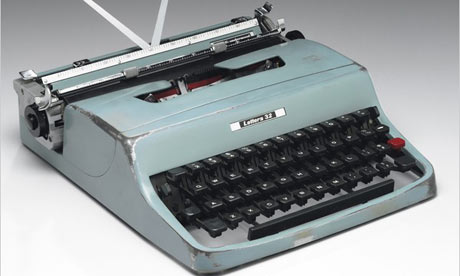So Cormac McCarthy is selling his typewriter. Traditionalists need not fear: he's replacing it with another one. The retired machine, bought circa 1963, has just got a bit worn down after almost half a century of clacking away, churning out a dozen novels and a sheaf of other works.
Today the Guardian's Books Blog lists a few other old-school authors who still love their old-fashioned typewriters. Don DeLillo says "I need the sound of the keys...The hammers striking the page. I like to see the words, the sentences, as they take shape." Will Self says that with a typewriter, "You don't revise as much, you just think more, because you know you're going to have to retype the entire fucking thing." (I, and several of my fellow editors, believe that since the word processor came into widespread use, the tendency of manuscripts to balloon to excessive lengths has become more pronounced.)
I know exactly what DeLillo means about the sound of the keys. The photo of McCarthy's trusty Olivetti reminded me of my mother's Hermes Rocket, another slim but sturdy portable whose keyboard I gleefully bashed away at long before I knew how to actually read or write. I remember exactly how satisfying it felt to hear the clickety-clack and see the letters marching across the page. Who cared if they made words?
But when I learned how to make words of my own, using the typewriter got to be even more fun. I even, at age 5 or so, wrote a very, very short novel titled "Sandy the Sandpail." I honestly don't remember the plot of S. the S., but I do remember chapter 6, because other members of my family have enjoyed, for decades, quoting it at me in its entirety:
"Sandy the Sandpail had a friend called Goldie. Nothing happened to Goldie."
Obviously, the use of the typewriter has influenced the elliptical style that Cormac McCarthy and I share.
